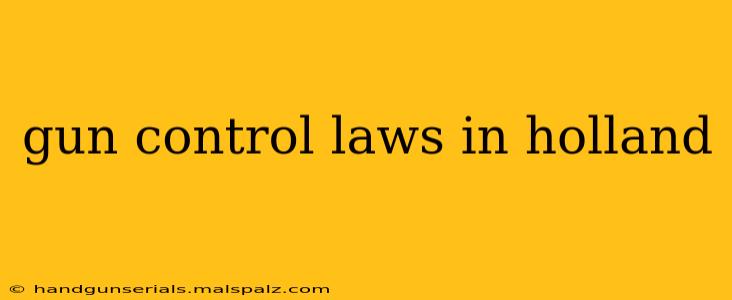The Netherlands maintains a relatively strict approach to firearm ownership, prioritizing public safety while acknowledging the rights of responsible gun owners. Understanding Dutch gun control requires examining its multifaceted regulations, which are designed to balance these competing interests. This article provides a detailed look at the current laws, their enforcement, and the ongoing debate surrounding them.
Obtaining a Firearm License in the Netherlands
The process of obtaining a firearm license in the Netherlands is rigorous and demanding. It's not a simple matter of filling out a form; it involves a thorough vetting process designed to ensure only responsible individuals can own firearms.
Key Requirements:
-
Need Demonstration: Applicants must demonstrate a legitimate need for a firearm. This is a crucial aspect and significantly limits who can own a weapon. Acceptable reasons often include hunting, sport shooting (membership in a recognized shooting club is usually required), or collecting (with specific requirements for storage and handling). Self-defense is generally not considered a valid reason.
-
Background Check: A comprehensive background check is conducted, scrutinizing the applicant's criminal history, mental health records, and overall suitability. This includes interviews and potential investigations.
-
Competency Test: Applicants must demonstrate competence in safe handling and use of the firearm they wish to possess. This typically involves passing a written exam and a practical shooting test.
-
Storage Requirements: Strict storage regulations are in place, requiring secure firearm safes that meet specific safety standards. Failure to comply can result in significant penalties.
-
License Categories: Licenses are categorized depending on the type of firearm and intended use. Licenses for hunting rifles differ from those for sporting handguns, for instance.
Types of Firearms Permitted
While the acquisition process is stringent, it doesn't mean all firearms are prohibited. However, certain types are subject to stricter regulations or outright bans.
Permitted Firearms (with license):
- Hunting rifles: Often shotguns and rifles specifically designed for hunting, subject to specific license categories and regulations.
- Sport shooting firearms: Handguns and rifles suitable for target practice and competition, generally limited to those used by members of recognized shooting clubs.
- Collecting firearms: Antique and historical firearms can be collected under specific licenses with strict documentation and storage requirements.
Restricted or Prohibited Firearms:
- Automatic weapons: Fully automatic firearms are generally prohibited.
- Certain handguns: Specific handgun models might be restricted or banned based on their potential for misuse.
- Improvised firearms: Homemade or modified firearms are strictly prohibited.
Enforcement and Penalties
The Dutch authorities take firearm regulations seriously. Enforcement involves regular inspections by the police, who have the power to revoke licenses and seize firearms if regulations are not met. Penalties for illegal firearm possession or misuse can be severe, including substantial fines and imprisonment.
Ongoing Debate and Future Directions
Despite the relatively strict regulations, there is ongoing debate surrounding gun control in the Netherlands. Some advocate for stricter measures, while others argue for more flexibility for responsible gun owners. The discussion is often centered around the balance between public safety and the rights of legal firearm owners. This ongoing discourse shapes the evolution of gun control legislation in the country.
Conclusion
The Netherlands' approach to gun control is characterized by a rigorous licensing system, emphasizing responsible firearm ownership and public safety. While the system allows for legal firearm possession for specific purposes, the stringent requirements and penalties for violations aim to minimize misuse and maintain a relatively low rate of gun violence. The ongoing debate surrounding the specifics of the laws reflects the country’s commitment to finding a balance between individual rights and the collective need for security.

